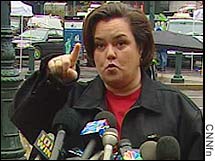NEW YORK (CNN/Money) -
A judge ruled Wednesday that neither side in the Rosie O'Donnell trial deserved damages in the dispute with her former publisher over the demise of Rosie magazine.
 |
|
| Rosie O'Donnell on her way into court in New York Wednesday morning. |
In his statement, New York Supreme Court Justice Ira Gammerman said Gruner & Jahr's lawsuit was "ill-conceived," CNNfn reported. Gammerman also said that outside of legal fees, neither side proved any damages.
An estimate that the magazine was worth a projected $65 million was tossed around but not backed up by testimony, he added, noting there was no proof that the magazine was going to be a profitable venture, as there had been testimony that it was losing money.
Gammerman said really what was at stake were bragging rights.
But despite the lack of a ruling in favor of either side, one expert said O'Donnell is the real winner.
"I think it's a big victory for Rosie. Who doesn't?," said Charles Sims, a partner in the entertainment law practice of Proskauer Rose LLP. "Rosie didn't want this fight. She wouldn't have brought this lawsuit if they didn't sue her (first). She just wanted to show that the claims were unjustified."
| Read the Complaints
|

|
|
|
|
O'Donnell made a brief statement after the decision, saying she was glad the trial was over.
"So many times peace was offered and war was chosen," O'Donnell said. "I have no vengeance against the company. I am happy about the fact that it's finally over."
Attorneys for O'Donnell said she will be pursuing payment for her legal fees. The judge invited briefs from both sides and will review them in December, according to the lawyers.
Meanwhile, attorneys for Gruner & Jahr said they were looking forward to a final decision from the judge.
| 
| |

| 
| 
|

|
 Judge decides not to award damages to either side in Rosie O'Donnell trial. CNNfn's Mary Snow reports. Judge decides not to award damages to either side in Rosie O'Donnell trial. CNNfn's Mary Snow reports.
|
 Play video
Play video
(Real or Windows Media)
|
| 
|

|
|
"It's not over until it's over," said Marty Hyman, attorney for Gruner & Jahr. "The judge obviously has substantial doubt as to whether Rosie would even have been profitable ... Magazines take years before they become profitable."
Attorneys for Gruner & Jahr said they would make this case in the briefs due to the judge next month.
Sims, who represents various publishing companies, said he has tried cases in front of Judge Gammerman in the past and that he's unlikely to change his decision for the final ruling.
"It's theoretically possible that it could change ... but the likelihood that he'll change his mind is extraordinarily small," Sims said.
He added that he wouldn't be surprised if O'Donnell and Gruner & Jahr settled the case in the next week or so, choosing to agree to "walk away."
O'Donnell left Rosie magazine 13 months ago, following a dispute over editorial control, and the publisher shut the publication shortly afterward.
Gruner & Jahr, owned by the German publisher Bertelsmann AG, sued O'Donnell for $100 million, alleging she acted unprofessionally and breached her contract when she pulled out of the venture in September 2002.
O'Donnell countersued for $125 million, saying Gruner & Jahr took away her editorial control after Gruner & Jahr revamped the old McCall's magazine and relaunched it as Rosie in early 2001.
During the trial, witnesses for the publisher testified that the 41-year-old entertainer was difficult to work with and wanted every decision to be her own. O'Donnell testified that she should have been allowed editorial control over a magazine with her name on it. Both alleged a breach of contract by the other party.
In testimony on Monday, Gruner & Jahr Chief Financial Officer Larry Diamond answered questions about a clause that would have allowed either party to quit the magazine venture, without penalty, if it lost more than $4.2 million by the end of June 2002. Diamond agreed that he did not want the actual losses to go below $4.2 million.
Attorneys for Gruner & Jahr said after the trial that allegations that financial statements had been manipulated were withdrawn.
Sims said it's unlikely that the publishing company would decide it was worthwhile to appeal the judge's final decision, if it's unfavorable.
Rosie said previously that she wouldn't appeal.

|

